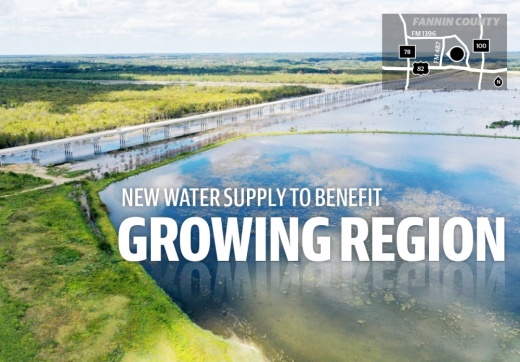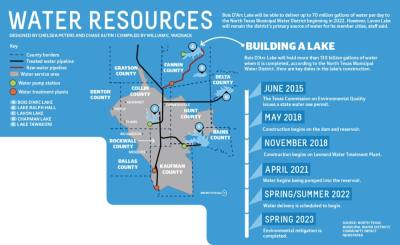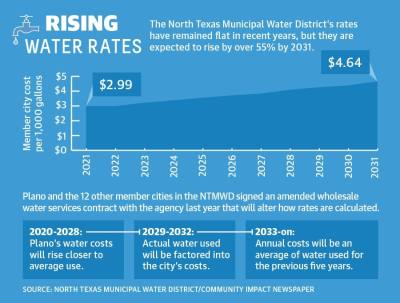Next year, the upcoming Bois D’Arc Lake in Fannin County will be a new source of water for the city. However, City Manager Mark Israelson said that will not change Plano’s conservation strategy.
“Water is a precious resource,” he said. “Everybody needs it, and we know that it’s needed here in Plano.”
The $1.6 billion Bois D’Arc Lake project will act as a reservoir for the North Texas Municipal Water District’s service area, which includes Plano. NTMWD officials estimate its service area’s population will grow to around 3.6 million people by the year 2065.
While Plano’s water rates were not changed for fiscal year 2021-22, a representative from its water rate consultants, Willdan Financial Services, said they are likely to rise starting next year.
“Rates are going to go up by an average of 5%-7% a year starting in fiscal year [2022-]23,” Willdan Vice President Dan Jackson said during a Sept. 13 Plano City Council meeting.
The planned rate increases from the district are part of an amended wholesale services contract approved last year by all 13 of its member cities.
The agreement will allow cost sharing to be phased in for the district’s member cities by 2033.
Israelson said that change in how rates are calculated will encourage cities to continue to conserve water.
“There is a benefit that you can gain from [conservation] by lowering the amount of your rolling average,” he said. “That preserves those resources ... and hopefully it makes the current reservoirs we have, as well as Bois D’Arc, last even longer.”
Water rates to rise
The water district estimates that Plano will use more than 20 billion gallons of water in 2022.
The district’s rates will stay flat at $2.99 per 1,000 gallons for members through 2022. However, rates are projected to rise by 22 cents per 1,000 gallons in 2023, per the district’s website.
According to a 2021 water rate survey done by the Texas Municipal League, the average residence in Plano used nearly 6,300 gallons of water per month.
The water district acts as a water wholesaler and sets rates to cover its expenses for the district’s partner municipalities. From there, cities set their own rates that they charge businesses and residents, said Billy George, the district’s deputy director of water and wastewater.
Israelson said the water district has done a great job keeping water rates as low as possible, but constructing a reservoir like Bois D’Arc is an expensive proposition.
“What is charged back to the city is our proportion of the debt [for the new reservoir],” Israelson said.
As no tax revenues were used to construct the reservoir, the Texas Water Development Board approved over $1.47 billion in low-interest State Water Implementation Fund for Texas funding for the lake and its associated projects, per to the district’s website.
Jackson said the new contract with the water district will save Plano money it was required to spend under the previous rate structure.
“By the year 2031, essentially you’re not going to be paying for water that you don’t use any longer,” he said. “That is a significant benefit to the city ... and it is going to benefit your ratepayers significantly.”
Bois D’Arc Lake is a key project that will help meet the region’s water needs through 2040, George said.
“We are preparing for and prepared for the continued growth, providing for homes and businesses, and people,” he said. “These kinds of utilities, water being one of the most important, becomes an underlying driver for economic prosperity.”
Adding a new reservoir
Located northeast of Bonham in Fannin County, the 16,641-acre Bois D’Arc Lake is the first new major reservoir built in the state in nearly 30 years, according to the district’s website.
Construction for the new lake began in 2018, but planning goes back to the 1980s, George said. The district was able to start impounding water for the lake this year and build its dam.
When full, the lake is expected to be around 22 feet deep on average, according to the district website.
Fannin County Judge Randy Moore said he is hopeful the lake’s level will be able to start to rise early next year.
“This can be a win-win for both the water district and people that need water in Plano, Collin County and Fannin County,” Moore said.
Remaining work on the lake will continue into 2023, George said.
“The opening of the lake is in sight, but we need to be patient,” NTMWD Lake Operations Manager Jennifer Stanley said in a statement. “Much work remains to be completed before it is safe to open.”
The NTMWD currently draws its water from Lavon Lake to serve its northern member cities. But when Bois D’Arc Lake is finished, district staff said the exact portion of water from each water supply received by cities will likely vary from day to day.
The lake effect
Construction is also underway on Lake Ralph Hall, which will be located on the North Sulphur River in southeast Fannin County. That reservoir will become the water source for the Upper Trinity Regional Water District that serves mainly Denton County communities.
In addition to providing water, Moore said both lakes will be recreation attractions.
“These are just going to be tremendous assets,” he said. “We’re going to be the recreation county for all of North Texas.”
As part of the lake project, the NTMWD has spent more than $50 million to construct and improve 11 miles of roads and bridges in Fannin County, per the district’s website.
Beyond those infrastructure improvements, Moore said the county itself has not benefited much from the development of the lake.
“But we weren’t even expecting [any benefits] until we see water in the lake [and] we see the development companies come in,” he said.
Since the water district is a non-taxable entity, Moore said the lake will not equate to more taxes for the county. Instead, Moore said he expects the benefits from visitors and recreation at the lake to help offset the loss of that tax base.
“Bois D’Arc is a promise,” Moore said. “The promise is all the development [that] will come [from] people coming in to build homes [and] to go fish [and] hunt.”
Miranda Jaimes contributed to this report.
Editor's note: This article has been updated to clarify a statement made by Billy George, the district’s deputy director of water and wastewater. The Bois D'Arc project will help meet the region's needs through 2040.







